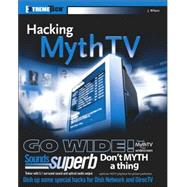
Ed Tittel’s passion for media was kindled right out of undergraduate school, way back in 1973, when he had the extremely good fortune to be hired as a studio engineer at the Library of Congress. Not only did Bob Carneal and John Howell teach Ed the basics of good audio engineering and careful audition of the resulting sounds, they also taught him the importance of careful design and quality implementation. Since then, Ed has gone through numerous iterations of building a great entertainment center, and has really enjoyed learning how to meld a PC into that mix. Ed’s interest in media PCs began with his last ExtremeTech book on Windows Media Center PCs, but his excitement peaked when he realized that MythTV offered an open-ended, more flexible, and client-server based implementation of the kind of functionality that MCE offers, kicked up several notches. In working on this book, Ed refreshed his knowledge of the first real operating system he ever learned (the second Berkeley Software Distribution, aka 2BSD, circa 1979), and learned to appreciate how far Linux has come and how little UNIX has really changed.
Matt Wright is a longtime home theater PC (HTPC) enthusiast and computer fiend. He’s been working full-time in the industry for nearly five years, and is a regular contributor to (and resident expert at) HTPCnews.com, one of the most popular HTPC online destinations. Matt also contributed two chapters and chunks of several more to Wiley’s Building the Ultimate Home Theater PC (Wiley, 2005) and consults regularly with professional and individual clients on HTPC topics, hardware, and technology.
Justin Korelc, at six years of age, asked his father how he could learn to use a computer. Instead of being given an obvious or easy answer, Justin’s father sat him down at the console, handed him a copy of K&R’s classic The C Programming Language, and gave him a gentle introduction to basic shell input/output. This proved instrumental in Justin’s personal and professional growth, starting with a migration from BSD UNIX to Linux in his teenage years, which eventually led him to write about his experiences.Today, Justin works as a freelance author writing articles and occasional book chapters for a variety of online and traditional publishers. Although his primary focus targets Linux and open-source software, he is also quite knowledgeable in the areas of hardware, network protocols, and a variety of unusual programming concepts, most of which center around security topics.
|
|||
|
|||
|
|||
|
|||
|
|||
|
|||
|
|||
|
|||
|
|||
|
|||
|
|||
|
|||
|
|||
|
|||
|
|||
|
|||
|
|||
|
|||
|
|||
|
|||
|
|||
|
|||
|
|||
|
|||
|
|||
|
|||
|
|||
|
|||
|
The New copy of this book will include any supplemental materials advertised. Please check the title of the book to determine if it should include any access cards, study guides, lab manuals, CDs, etc.
The Used, Rental and eBook copies of this book are not guaranteed to include any supplemental materials. Typically, only the book itself is included. This is true even if the title states it includes any access cards, study guides, lab manuals, CDs, etc.